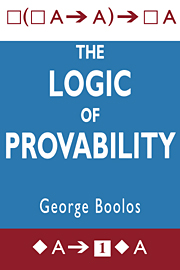Book contents
- Frontmatter
- Contents
- Preface
- Introduction
- 1 GL and other systems of propositional modal logic
- 2 Peano arithmetic
- 3 The box as Bew(x)
- 4 Semantics for GL and other modal logics
- 5 Completeness and decidability of GL and K, K4, T, B, S4, and S5
- 6 Canonical models
- 7 On GL
- 8 The fixed point theorem
- 9 The arithmetical completeness theorems for GL and GLS
- 10 Trees for GL
- 11 An incomplete system of modal logic
- 12 An S4-preserving proof-theoretical treatment of modality
- 13 Modal logic within set theory
- 14 Modal logic within analysis
- 15 The joint provability logic of consistency and ω-consistency
- 16 On GLB: The fixed point theorem, letterless sentences, and analysis
- 17 Quantified provability logic
- 18 Quantified provability logic with one one-place predicate letter
- Notes
- Bibliography
- Index
- Notation and symbols
17 - Quantified provability logic
Published online by Cambridge University Press: 08 January 2010
- Frontmatter
- Contents
- Preface
- Introduction
- 1 GL and other systems of propositional modal logic
- 2 Peano arithmetic
- 3 The box as Bew(x)
- 4 Semantics for GL and other modal logics
- 5 Completeness and decidability of GL and K, K4, T, B, S4, and S5
- 6 Canonical models
- 7 On GL
- 8 The fixed point theorem
- 9 The arithmetical completeness theorems for GL and GLS
- 10 Trees for GL
- 11 An incomplete system of modal logic
- 12 An S4-preserving proof-theoretical treatment of modality
- 13 Modal logic within set theory
- 14 Modal logic within analysis
- 15 The joint provability logic of consistency and ω-consistency
- 16 On GLB: The fixed point theorem, letterless sentences, and analysis
- 17 Quantified provability logic
- 18 Quantified provability logic with one one-place predicate letter
- Notes
- Bibliography
- Index
- Notation and symbols
Summary
Here and in our final chapter we study quantified (or predicate) provability logic. We consider translations of formulas of quantified modal logic (QML) into the language of arithmetic under which the box □ of modal logic is taken, as in earlier parts of this work, to represent provability in arithmetic. In the “pure” predicate calculus, function signs, the equals-sign =, and modal logical symbols such as □ and ◊ do not occur. We shall define an expression to be a formula of QML if and only if it can be obtained from a formula of the “pure” predicate calculus, by replacing (zero or more) occurrences of the negation sign ¬ with occurrences of □. Thus □ and ¬ have the same syntax in QML, as was the case in propositional modal logic.
Our results are negative: we show that there are no simple characterizations of the always provable or always true sentences of QML. Apart from the definition of the sentence D and Lemma 7 below, curiously little use is made of the quantificational–modal–logical properties of Bew(x). Indeed, the main definitions, techniques, and theorems that are to follow may seem to come from a branch of logic rather unrelated to the one we have been studying up to now.
We shall suppose that the variables, v0,v1,…, are common to the languages of QML and of arithmetic. The first n variables are, of course, v0,…,vn−1.
Information
- Type
- Chapter
- Information
- The Logic of Provability , pp. 219 - 241Publisher: Cambridge University PressPrint publication year: 1994
